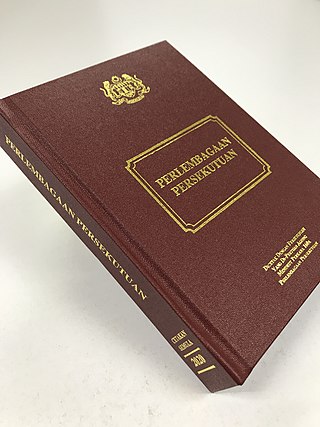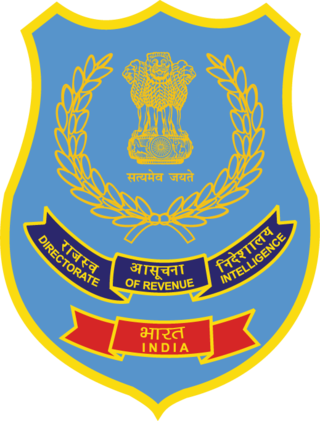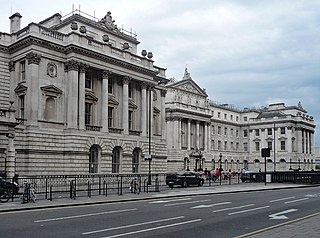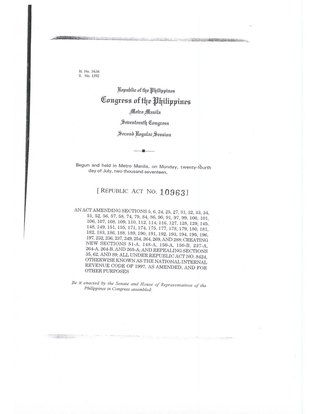
The Federal Constitution of Malaysia, which came into force in 1957 as the Constitution of the Federation of Malaya and was amended in 1963 to form the Constitution of Malaysia, is the supreme law of Malaysia and contains a total of 183 articles. It is a written legal document influenced by two previous documents, the Federation of Malaya Agreement 1948 and the Independence Constitution of 1957. The Federation was initially called the Federation of Malaya and it adopted its present name, Malaysia, when the states of Sabah, Sarawak and Singapore became part of the Federation. The Constitution establishes the Federation as a constitutional monarchy, having the Yang di-Pertuan Agong as the Head of State with largely ceremonial roles. It provides for the establishment and organisation of three main branches of the government: the bicameral legislative branch called the Parliament, which consists of the House of Representatives and the Senate ; the executive branch led by the Prime Minister and his Cabinet Ministers and the judicial branch headed by the Federal Court.

A customs officer is a law enforcement agent who enforces customs laws, on behalf of a government.
The Tariff of 1842, or Black Tariff as it became known, was a protectionist tariff schedule adopted in the United States. It reversed the effects of the Compromise Tariff of 1833, which contained a provision that successively lowered the tariff rates from their level under the Tariff of 1832 over a period of ten years until the majority of dutiable goods were to be taxed at 20%.

A Finance Act is the headline fiscal (budgetary) legislation enacted by the UK Parliament, containing multiple provisions as to taxes, duties, exemptions and reliefs at least once per year, and in particular setting out the principal tax rates for each fiscal year.
The Kennedy Round was the sixth session of General Agreement on Tariffs and Trade (GATT) multilateral trade negotiations held between 1964 and 1967 in Geneva, Switzerland. Congressional passage of the U.S. Trade Expansion Act in 1962 authorized the White House to conduct mutual tariff negotiations, ultimately leading to the Kennedy Round. Participation greatly increased over previous rounds. Sixty-six nations, representing 80% of world trade, attended the official opening on May 4, 1964, at the Palais des Nations. Despite several disagreements over details, the director general announced the round's success on May 15, 1967, and the final agreement was signed on June 30, 1967—the last day permitted under the Trade Expansion Act. The round was named after U.S. President John F. Kennedy, who was assassinated six months before the opening negotiations.

The Hong Kong Customs and Excise Department is the customs service of the Hong Kong Special Administrative Region. The agency was established to protect Hong Kong from smuggling, ensure the collection of duties on taxable goods, detect and prevent drug trafficking and abuse, safeguard intellectual property rights, protect consumer interests, facilitate legitimate business and uphold Hong Kong's trade reputation, regulate money service operators and dealers in precious metals and stones, and combat money laundering and terrorist financing.

A bonded warehouse, or bond, is a building or other secured area in which imported but dutiable goods may be stored, manipulated, or undergo manufacturing operations without payment of duty. They may then be again exported without payment of duty. It may be managed by the state or by private enterprise. In the latter case a customs bond must be posted with the government. This system is widely used in developed countries throughout the world.
The State List or List-II is a list of 61 items. Initially there were 66 items in the list in Schedule Seven to the Constitution of India. The legislative section is divided into three lists: the Union List, the State List and the Concurrent List. Unlike the federal governments of the United States, Switzerland or Australia, residual powers remain with the Union Government, as with the Canadian federal government.

The Directorate of Revenue Intelligence (DRI) is an Indian intelligence agency. It is India's apex anti-smuggling intelligence, investigations and operations agency.

His or Her Majesty's Excise refers to 'inland' duties levied on articles at the time of their manufacture. Excise duty was first raised in England in 1643. Like HM Customs, the Excise was administered by a Board of Commissioners who were accountable to the Lords Commissioners of the Treasury. While 'HM Revenue of Excise' was a phrase used in early legislation to refer to this form of duty, the body tasked with its collection and general administration was usually known as the Excise Office.

An excise, or excise tax, is any duty on manufactured goods that is normally levied at the moment of manufacture for internal consumption rather than at sale. It is therefore a fee that must be paid in order to consume certain products. Excises are often associated with customs duties, which are levied on pre-existing goods when they cross a designated border in a specific direction; customs are levied on goods that become taxable items at the border, while excise is levied on goods that came into existence inland.

The Royal Malaysian Customs Department ; is a government department body under the Ministry of Finance. RMCD functions as the country's main indirect tax collector, facilitating trade and enforcing laws.

The Ministry of Domestic Trade and Costs of Living, abbreviated KPDN, is a ministry of the Government of Malaysia that is responsible for domestic trade, living costs, co-operatives, consumerism, franchise and others.

The Societies Act 1966 is an Act of the Parliament of Malaysia, relating to the registration of societies.

The Local Government Act 1976 is an Act of the Parliament of Malaysia, which was enacted to revise and consolidate the laws relating to local government.

The Customs Act 1967, is an Act of the Parliament of Malaysia, relating to customs. Many subsequent amendments to it have also been passed.

The Malaysian Anti-Corruption Commission Act 2009 is an Act of the Parliament of Malaysia. It was enacted to provide for the establishment of the Malaysian Anti-Corruption Commission, to make further and better provisions for the prevention of corruption and for matters necessary thereto and connected therewith.

The Tax Reform for Acceleration and Inclusion Law, officially designated as Republic Act No. 10963, is the initial package of the Comprehensive Tax Reform Program (CTRP) signed into law by President Rodrigo Duterte on December 19, 2017.
The constitutional provisions in India on the subject of distribution of legislative powers between the Union and the States are defined primarily under its articles 245 and 246. The Seventh Schedule to the Constitution of India specifies the allocation of powers and functions between the Union and the State legislatures. It embodies three lists; namely, the Union List, the State List, and the Concurrent List. The Union list enumerates a total of 97 subjects over which the power of the Union parliament extends.curently 98 subjects in centre list. Similarly, the State list enumerates a total of 66 subjects for state legislation. The schedule also spells out a Concurrent list embodying a total of 47 subjects on which both the Union parliament and the state legislatures are empowered to legislate, though this is subject to the other provisions of the constitution that give precedence to the union legislation over that of the states.

The Petroleum Act 1868 is an Act of the Parliament of the United Kingdom to amend the Petroleum Act 1862 relating to the licensing, storage and sale of petroleum and petroleum products.













